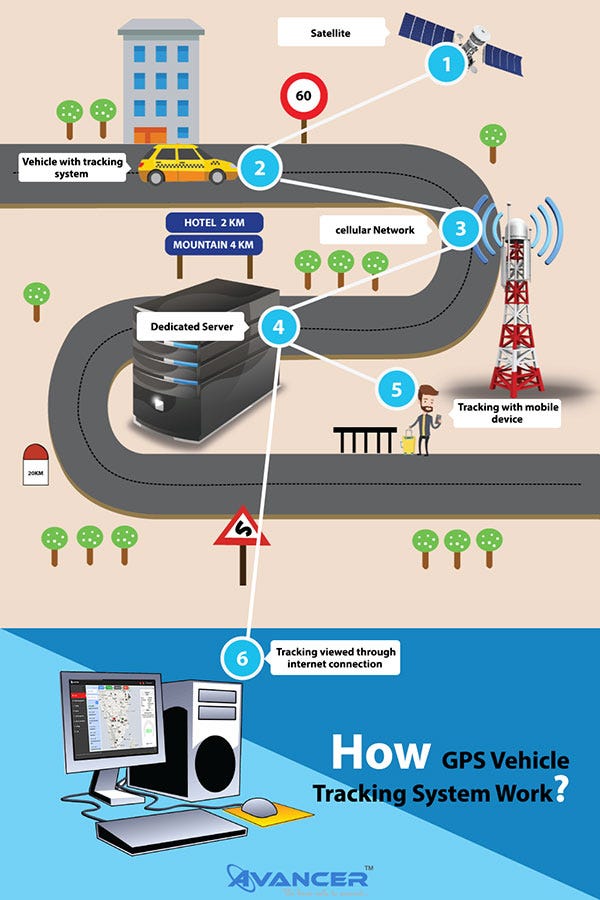Comprehensive Guide to GPS Tracking: Enhance Safety and Efficiency
Comprehensive Guide to GPS Tracking: Enhance Safety and Efficiency
Blog Article
Browsing the Future of GPS Tracking: Innovations, Obstacles, and Opportunities Ahead
As we stand at the crossroads of technological developments and societal ramifications, the landscape of General practitioner monitoring is positioned for a transformative trip in advance. With fantastic development comes terrific responsibility, as data privacy concerns loom large and protection difficulties in General practitioner tracking raising relevant concerns regarding protecting delicate details.
Evolution of GPS Modern Technology
Created for armed forces objectives, General practitioner technology has developed to become a common device in numerous fields, including transport, logistics, farming, and personal navigation. Early GPS systems were defined by minimal insurance coverage, reduced precision, and bulkier equipment requirements.
One key turning point in the development of GPS modern technology was the advancement of Selective Accessibility (SA) in the 1990s, which intentionally broke down the accuracy of civilian GPS signals. The discontinuation of SA in 2000 considerably improved GPS precision for private individuals. Succeeding innovations, such as the deployment of additional satellite constellations like Galileo and BeiDou, have better enhanced GPS protection and accuracy, making it an important device in day-to-day life. As general practitioner modern technology proceeds to progress, we can anticipate additional renovations in performance, precision, and coverage, opening up new opportunities for development and applications across different markets.
Real-Time Tracking Advancements
Building on the improvements in GPS technology that have actually revolutionized precision and insurance coverage, real-time tracking has actually become an essential area of innovation with profound ramifications across various sectors. Real-time monitoring improvements allow services and organizations to check personnel, assets, and lorries instantly, supplying important insights for decision-making procedures - gps tracking. By leveraging real-time data, firms can boost functional efficiency, enhance customer care, and ensure the security and safety and security of their properties
One of the crucial advancements in real-time monitoring is the integration of fabricated intelligence and machine knowing algorithms, which allow anticipating analytics and anomaly detection. These capacities enable positive maintenance scheduling, path optimization, and threat mitigation methods. Moreover, the evolution of real-time tracking systems has brought about the growth of mobile applications and personalized dashboards, encouraging individuals to access vital details anytime, anywhere.
Information Privacy Concerns
Information privacy concerns include various facets, consisting of the storage, sharing, and retention of area data. Organizations must apply robust protection actions to secure general practitioner monitoring data from cyber risks and data violations. Transparent policies concerning information collection methods and the purpose of monitoring are necessary to develop trust with customers and guarantee compliance with information security policies.

Safety Challenges in GPS Monitoring
Resolving information personal privacy problems in GPS monitoring is delicately linked to alleviating the protection tests that develop from possible vulnerabilities in the innovation. One of the key security difficulties in GPS tracking is the danger of unauthorized access to sensitive place information - gps tracking. Hackers might obstruct general practitioner signals, adjust area info, and read this even track individuals without their consent. This not only attacks individual privacy but additionally presents significant safety and security dangers.

An additional safety and security difficulty is the potential for obstructing or spoofing GPS signals. By interfering or broadcasting incorrect signals with legitimate ones, harmful actors can trick GPS receivers and adjust place data. This presents risks not just for specific customers yet also for governmental and army applications my explanation that count on specific positioning details. Implementing robust file encryption, verification measures, and signal verification protocols are critical action in addressing these safety difficulties in GPS monitoring.
Arising Opportunities in the Market
The expanding area of General practitioner monitoring modern technology provides a myriad of appealing chances for market growth and advancement. One crucial opportunity exists in the development of General practitioner monitoring applications beyond conventional sectors. General practitioner tracking can revolutionize patient treatment by allowing remote surveillance of crucial indications and making certain prompt medical aid.
One more substantial possibility in the GPS tracking market is the combination of innovative analytics and artificial intelligence. By leveraging these innovations, companies can obtain useful understandings from GPS data to improve functional effectiveness, improve decision-making procedures, and offer customized solutions to clients. Additionally, the enhancing demand for connected devices and IoT remedies presents a ripe chance for general practitioner tracking business to increase their offerings and produce cutting-edge solutions that provide to an extra linked globe. By taking advantage of on these emerging opportunities, general practitioner tracking firms can place themselves for continual growth and success in the dynamic landscape of the industry.
Verdict
To conclude, the future of GPS tracking is marked by continuous development and development in technology. Real-time tracking advancements and emerging chances present appealing leads for the industry. Data privacy problems and safety and security challenges continue to be significant hurdles that need to be attended to. As the sector progresses, navigating these difficulties will certainly be vital to make certain go now the continued growth and success of general practitioner tracking technology.
With excellent development comes wonderful duty, as data privacy problems loom huge and safety and security obstacles in General practitioner tracking raise essential concerns concerning safeguarding sensitive information.With the fast proliferation of General practitioner tracking technology in numerous industries, addressing data personal privacy problems has come to be an essential crucial for both services and customers alike. The collection of location information via General practitioner monitoring raises substantial personal privacy issues, as it makes it possible for the monitoring of individuals' movements and behaviors. Organizations utilizing GPS tracking have to prioritize protecting this data to prevent unauthorized access or misuse that can compromise individuals' privacy rights.
Companies should execute durable protection procedures to protect General practitioner monitoring data from cyber threats and data violations.
Report this page